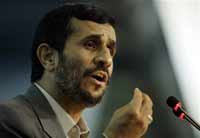Iran continues to bravely slam USA and its closest ally, Israel
Shimon Peres, the President of Israel, is not happy about UN’s decision to invite Iranian President Mahmoud Ahmadinejad to the food summit in Rome, Italy. Peres claimed that Ahmadinejad’s appearance on the summit would distract attention from problems of hunger in the world.

"Inviting Ahmadinejad to this event is a disservice to the purpose of the meeting. The world is short of food, not of bombs, the world is short of help, not of hatred,", Peres said in an interview with The Associated Press.
The Iranian president stole attention of the world media again when he stated at the Rome food conference that Israel was “doomed to go.”
Ahmadinejad does not conceal his hatred of the Jewish state and continues to predict its destruction. The Israeli administration believes that Iran is developing a nuclear program and thus identifies the nation as its biggest threat, taking into consideration the fact that Ahmadinejad already promised to wipe Israel off the map.
Another top official of Iran, Akbar Hashemi Rafsanjani stated recently that Iran and other Muslim nations must stop the USA from enslaving Iraqis. The official said that Washington and Baghdad try to enslave Iraq though a long-term security agreement.
Rafsanjani also said that the US-led occupation of Iraq represents a danger to all nations of the region. The above-mentioned security deal would create a permanent occupation of the region, the official said.
The comments were the strongest and most high-level public condemnations of the potential security deal by an Iranian official. Rafsanjani, a former president of Iran, heads two of the country's most powerful clerical governing bodies, the Expediency Council and the Assembly of Experts.
"The essence of this agreement is to turn the Iraqis into slaves before the Americans, if it is sealed. This will not happen. The Iraqi people, the Iraqi government and the Islamic nation will not allow it," Rafsanjani said.
Iran has been critical of the security agreement, largely in private talks with Iraqi officials. The deal, which the Iraqis and Americans hope to finish in mid-summer, would establish a long-term security relationship between Iraq and the United States, and a parallel agreement would provide a legal basis to keep U.S. troops in Iraq after the U.N. mandate expires at the end of the year.
Supporters believe the deal would help assure Iraq's Arab neighbors, notably Saudi Arabia and the Gulf States, that Iraq's Shiite-led government would not become a satellite of Shiite-dominated Iran as American military role here fades.
But public critics in Iraq worry the deal will lock in American military, economic and political domination of the country. Some Iraqi politicians have attacked the deal, especially those loyal to Muqtada al-Sadr, the anti-American cleric whose militiamen fought U.S. and Iraqi troops in Baghdad until a May truce ended seven weeks of fighting.
AP photo
Subscribe to Pravda.Ru Telegram channel, Facebook, RSS!




